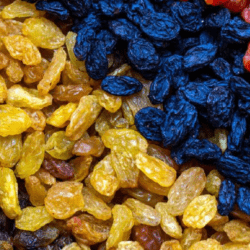What Are Raisins?
Raisins are parched grapes. The drying procedure focuses on both the nutrients and sugars present in grapes, producing raisins nutrient-dense and calorie-dense.
Raisins developed in the Middle East before pushing their way to Europe, where they were especially popular among the Greeks and Romans. Historically, raisins were utilized as currency, as prizes in sporting events, and to treat ailments like
Today, raisins are public at most supermarkets. They can be made from a vast assortment of grape kinds. Additional grapes make additional flavors and surfaces in the raisins.
Raisins can also be dried in various ways. Natural-dried raisins are parched in the sun and have a dim color. They carry about 3 weeks to totally dry. They can also be dried in a home or retail dehydrator.
Because they’re elevated in inherently occurring sugar as well as calories, specialists say they should be eaten in temperance.
Raisin Nutrition Information
Raisins, sultanas, and currants have equivalent nutritional differentiae. All are wealthy in antioxidants – implications that assist your cells fight damaging molecules called free radicals. And they’re all good origins of:
Raisins also include boron. This mineral helps preserve good bone and joint health, can enhance wound recovery, and may enhance cognitive version.
Potential Health Benefits of Raisins
Raisins are a delicious and suitable food that can count a scope of nutrients to your diet. As a parched fruit, yet, they accomplish’t have the water range of traditional grapes. This causes them small filling and more comfortable to fill. Stick to tiny amounts to avoid counting too many calories to your diet.
Counting a handful to your grain or snack can hold some potential health godsends:
Hearth health. Research indicates that raisins could support lower your risk of heart illness by lowering blood pressure and blood sugar. The thread in raisins reduces your LDL (bad) cholesterol, which lessens strain on your heart.
Raisins are also a good start of potassium. Studies have discovered that low potassium groups contribute to high blood pressure, heart illness, and stroke. The dose of potassium your body requires boosts if your sodium information is high, which is expected in many people’s diets. As a low-sodium food, raisins are a wonderful way to ensure you’re getting sufficiently potassium.
Lower risk of chronic disease. Raisins have more elevated levels of antioxidants than numerous other dried fruits. That’s because the drying process focuses these antioxidants.
Antioxidants help stop cell damage induced by natural elements like aging and lifestyle manners. These plant-based combinations have been shown to decrease the risk of chronic ailments like diabetes, osteoporosis, and cancer.
Research indicates that phytonutrients may also include anti-inflammatory, pain relief, and brain-protective effects.
Gastrointestinal health. Raisins are a good source of soluble yarn, which aids digestion and relieves stomach problems.
Raisins also hold tartaric acid. Research indicates this protein may have anti-inflammatory effects, improve intestinal process, and help control the proportion of bacteria in your gut. One study discovered it may also act to decrease the risk of colorectal cancer.
Oral health. Some nutrients in raisins, like oleanolic and linoleic acid, may have antibacterial effects. Examinations have discovered that this effect may limit plaque-forming bacteria in your chops.
These antioxidants also support maintain beneficial oral pH levels. This can maintain your saliva from evolving too acidic, helping with cavity precluding.
Potential Risks of Raisins
Raisins are deemed safe for most someones. They also have a relatively low glycemic index, which means they don’t cause sharp points and dips in your blood sugar stories. This can make them a good lovely snack choice for people with diabetes.
But the dense nutrient range of raisins can cause negative flank products if you eat them in enormous amounts:
Unwanted weight gain. Some analysis shows that raisins can assist people lose or handle weight. But they’re somewhat high in calories per serving. So consume them in moderation if you want to bypass weight gain.
Stomach discomfort. The fiber in raisins is linked with a spectrum of health benefits. But too largely fiber in your diet can induce digestive issues like gas, bloating, and cramps.
Pesticide concerns. Raisins made from grapes sprinkled with pesticides may include residues. After the raisin-drying method, producers also occasionally fumigate storage spaces to keep problems away. Consuming high levels of pesticides has been linked to health issues like cancer, so it may be best to opt for organic raisins when feasible. Organic foods have more occasional pesticide residues.
How to Eat Raisins
Not only do raisins create a handy snack on their own for kids or adults, they’re region of many sweet and savory dishes from almost the world. They’re a good option to candy or other sweets, as they can benefit a sugar craving while delivering some nutritional usefulness.
Here are a few ideas for how to count raisins, sultanas, and currants into your diet:
- Mix with nuts and different dried fruits for a nourishing trail mix.
- Spread on lid of yogurt, oatmeal, or cereal.
- Bake into cookies, scones, or granola rods.
- Throw into a leafy salad, or try them in a lentil and grain salad.
- Count as a garnish to curry or stir-fry for a father of sweetness.
Healthier Alternatives
While the vitamins and minerals in raisins can help your fitness, they’re nearly 60% sugar. Raisins are typically cheaper than other parched fruits, but some other fruits may contain more suitable nutritional value.
If you’re monitoring your sugar intake, consider choices to raisins like:
- Dried apricots: They are lower in sugar and calories and a more useful source of iron and fiber.
- Prunes: They are more inferior in sugar and calories than raisins, wealthy in fiber, and pose more unreasonable risk from pesticides.
- Goji berries: While high in calories, they include approximately 30% smaller sugar than raisins and more elevated levels of antioxidants.





